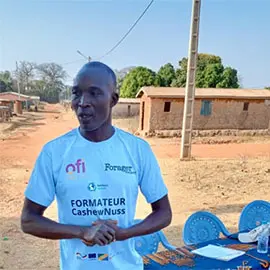CashewNuss: Advancing Sustainable Cashew Farming in Côte d’Ivoire
Guest Author: Maude Manoukian, Chief Community Officer, Forager Project
At Forager Project, our journey has always been about more than just food. We believe that small, thoughtful choices—what we eat, how we source ingredients, and who we partner with—can lead to a more sustainable future.
For years, cashews have been at the heart of what we do. They’re the foundation of our creamy Cashewmilk Yogurt, an essential source of protein in our plant-based shakes, and the star ingredient in most of the products we make. But behind every cashew is a farmer, a family, and a community working hard to make a living—often with limited resources and opportunities.
That’s why we asked ourselves: What more can we do?
The answer: CashewNuss, an initiative we’re launching with ofi and German development agency GIZ as part of our
One Small Step program. Through this partnership, we’re working hand-in-hand with 10,000 cashew farmers in Côte d’Ivoire to support sustainable farming, organic certification, business training, and community development.
Why this matters
For many cashew farmers in Côte d’Ivoire, their orchards are their only source of income. With just one harvest per year, it can be challenging to provide for their families, invest in their farms, or access the training and resources needed to grow their businesses.
Women farmers, in particular, face additional challenges—they often have less access to education, training, and markets, making it harder for them to build financial independence.
We believe sustainability isn’t just about the planet—it’s also about people. CashewNuss is about taking small but meaningful steps to support farmers, their families, and their communities in ways that create lasting change.

